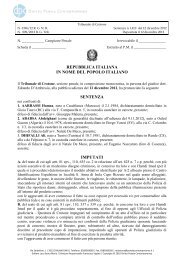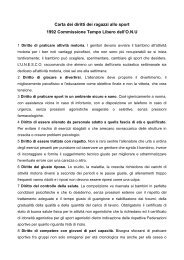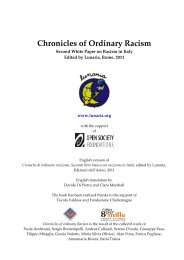Chronicles of ordinary racism 2011 - Cronache di ordinario razzismo
Chronicles of ordinary racism 2011 - Cronache di ordinario razzismo
Chronicles of ordinary racism 2011 - Cronache di ordinario razzismo
- No tags were found...
Create successful ePaper yourself
Turn your PDF publications into a flip-book with our unique Google optimized e-Paper software.
Italian legislation obsolete. Indeed, the ruling states that in cases involving the<br />
deportation <strong>of</strong> a non EU citizen, decisions must take into account in<strong>di</strong>vidual<br />
circumstances rather than simply acknowledging unlawful residence. This is in stark<br />
contrast with the perio<strong>di</strong>c, almost mechanic regularity <strong>of</strong> the deportation orders issued<br />
by the Interior Ministry. Moreover, still on the subject <strong>of</strong> the contrast between this EU<br />
<strong>di</strong>rective and Italian legislation, it is important to emphasize the fact that “recourse to<br />
detention […] should be restricted, and at all times proportionate to the means used and the<br />
target pursued […] if the enforcement <strong>of</strong> less coercive measures should prove insufficient”,<br />
while Italian regulations focus on forms <strong>of</strong> imme<strong>di</strong>ate compulsory deportation. To this<br />
we must add that the required approval <strong>of</strong> the police commissioner, apart from being<br />
far from proportional, is automatically called for by national legislation for the sole<br />
reason that the deportation may be impossible to carry out or there may be lack <strong>of</strong><br />
availability in the CIE. It is also necessary to bear in mind that, accor<strong>di</strong>ng to the<br />
<strong>di</strong>rective, Member States can refrain from granting a period set aside for voluntary<br />
departure (even one lasting under a week), but only if there is a concrete risk <strong>of</strong> flight<br />
on the part the foreigner in question, if his application to obtain a living permit was<br />
rejected on the grounds <strong>of</strong> being either clearly unfounded or fraudulent, or, lastly, if the<br />
foreigner is perceived as being a threat to public order, safety or national security.<br />
Therefore deportation orders issued before the 24 th <strong>of</strong> December 2010 cannot be further<br />
enforced nor legitimately prevent a foreigner from settling in the country, particularly<br />
when he has expressed an interest in applying for a regular living permit, for instance<br />
under the juris<strong>di</strong>ction <strong>of</strong> Law 102/2009. In substance, given that the deadline for the<br />
acknowledgement on the part <strong>of</strong> EU countries <strong>of</strong> the ruling has been and gone and<br />
considering that the effects <strong>of</strong> the clear, detailed and uncon<strong>di</strong>tional measures involved<br />
are imme<strong>di</strong>ately <strong>di</strong>scernible, once this deadline has passed 188 it becomes necessary to do<br />
away with the national laws deemed incompatible with the European ones.<br />
The provision, in Italian legislation, <strong>of</strong> a criminal sanction that guards against the<br />
flouting <strong>of</strong> a deportation order lies behind the inclusion in the administrative procedure<br />
<strong>of</strong> a criminal conviction that leads to the loss <strong>of</strong> personal freedom. The premises and<br />
characteristics <strong>of</strong> this measure are worlds apart from constraints on freedom that might<br />
occur during a deportation as envisaged by the European <strong>di</strong>rective, in both its abstract<br />
and applied forms. Such a mechanism would end up entirely eva<strong>di</strong>ng all guarantees<br />
imposed by the <strong>di</strong>rective for the safeguard <strong>of</strong> in<strong>di</strong>vidual freedom for foreigners<br />
undergoing a repatriation process, and thus invalidate the useful effects <strong>of</strong> the ruling<br />
with regard to the establishment <strong>of</strong> mandatory con<strong>di</strong>tions that allow a Member State to<br />
deprive a foreigner <strong>of</strong> his or her in<strong>di</strong>vidual freedom during repatriation procedures.<br />
188 On this matter, with sentence n. 170/1984 the Constitutional Court had observed that “ EU legislation operates<br />
on another plain, <strong>di</strong>fferent from the national one. Accor<strong>di</strong>ng to art 11 <strong>of</strong> our Constitution, the rulings enforced by it,<br />
are applied <strong>di</strong>rectly in our country, but stand apart from the intricacies <strong>of</strong> internal legislation: and if this holds, they<br />
cannot logically be judged by the same standards outlined for conflict resolution internal to our legislation” thus<br />
repeating what had already been established by the European Court <strong>of</strong> Justice with sentence 183/1973 that states:<br />
“Fundamental demands <strong>of</strong> equality and legal certainty demand that EU regulations – not to be interpreted as<br />
sources <strong>of</strong> international, foreign or internal law – must have complete and compulsory effectiveness and <strong>di</strong>rect<br />
application in all Member States, without the need for further rulings, as acts having the resonance and vali<strong>di</strong>ty <strong>of</strong><br />
laws in each EU country, so as to be simultaneously enforced and have equal and uniform power over all<br />
addressees”<br />
74










